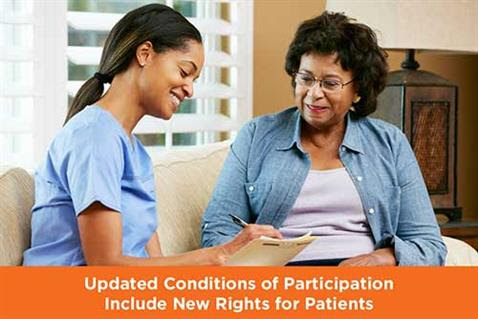CMS recently released new Medicare Conditions of Participation (CoP) for home health care agencies that are set to take effect on January 13, 2018. Because the CoP has not been updated in several decades, the changes are substantial, and agencies have a limited amount of time in which to update their policies and procedures to ensure compliance.
One area of the CoP that is seeing a substantial overhaul is the section on Patient Rights. Patient rights, and an agency’s responsibility for maintaining them, have always been an important part of the CoP, but the updated regulations add specificity to certain sections while also adding a few new rights to ensure that patients receive quality care in a safe environment.
According to the new proposed guidelines published in the Federal Register, the revised patient rights (section § 484.50) are governed by six standards: notice of rights, exercise of rights, rights of the patient, transfer and discharge, investigation of complaints, and accessibility. While the rules themselves are complex, the following is an overview of the proposals that CMS put forth in this area, and what you need to do as an agency to comply.
1. Notice of Rights
Under the new CoP, agencies must notify patients of their rights both verbally and in writing at the initial evaluation visit, before care begins. This notification must be provided in the patient’s preferred language, and in a way that he or she can understand. As part of this notification, the agency must also notify the patient of available services and how to access those services, as well as contact information for an administrator who will handle all questions and complaints related to patient rights. Patients and/or their representatives will also need to receive a copy of the OASIS privacy notice, and sign off confirming that they have received the copy of the notice of their rights.
What this means for your agency is that you need to develop a procedure for notifying patients of their rights. If you serve multilingual patients, and don’t already have resources in place, you will need to update your written information to reflect the new language requirements, and ensure that you have staff that can meet the needs of these patients. With advanced home health care software, you can streamline the management of the necessary documentation.
2. Exercise of Rights
The second standard of the CoP is the exercise of rights. In a nutshell, this standard states if patients are unable to exercise their own rights, then their rights can be exercised by a representative. In the case that the patient is declared incompetent by the state, the representative will be appointed by the state. Otherwise, rights will be exercised either by the person named by the patient, or the patient him or herself within the legal limits of the law.
For your agency, then, it’s important that you know who the patient’s representative is, and have the proper documentation to ensure they can act on behalf of the patient and exercise his or her rights.
3. Rights of the Patient
This standard outlines the specific rights of every home care patient. These rights cover a wide range of issues, including the right to consent to or refuse care, the right to see the written plan of care, and the right to receive notice of services that may not be covered by Medicare or when care will be reduced or terminated. This standard also includes the establishment of a home health hotline, and a prohibition on discrimination against patients who exercise their rights, and the need to make information about auxiliary services (like translation) available.
Your HHA needs to carefully review this standard, and make necessary changes to ensure that your team is aware of the new rights, and procedures are in place to ensure they are protected.
4. Transfer and Discharge
The Transfer and Discharge standard outlines the reasons that patients can be transferred or discharged, and the right for patients to be informed of an HHA’s policies governing admission, transfer, and discharge before care begins. It also ensures that an HHA will ensure that a patient is transferred to another entity that can provide more appropriate care.
To ensure compliance, review your agencies transfer and discharge policies, and align them with the regulations.
5. Investigation of Complaints
Standard number five ensures that all complaints made by patients or their representatives will be investigated. It also mandates that HHA staff must report any suspected instances of abuse, neglect, mistreatment, or theft that they notice during the normal delivery of care.
Compliance with this standard means that your agency must revise its complaint policy to be better aligned with the rules. If necessary, provide additional training to ensure that your staff can identify the signs of abuse or neglect, and has a protocol to follow.
6. Accessibility
Finally, the accessibility standard refers both to providing information to patients in a language that they can understand, as well as ensuring that all patients of a similar level of acuity, regardless of whether they are Medicare or non-Medicare, are accepted by an HHA.
Again, this means that your agency may need to translate written materials and hire a multilingual staff. Review your policies regarding patient acceptance to ensure you are in compliance.The new Conditions of Participation are complex — the document is more than 300 pages long — and you will undoubtedly have questions. Take time now to review the new rules and seek clarification, to avoid issues when the rules go into effect. And in the meantime, check out Complia Health’s software products to better manage your agency in this ever-changing environment.




